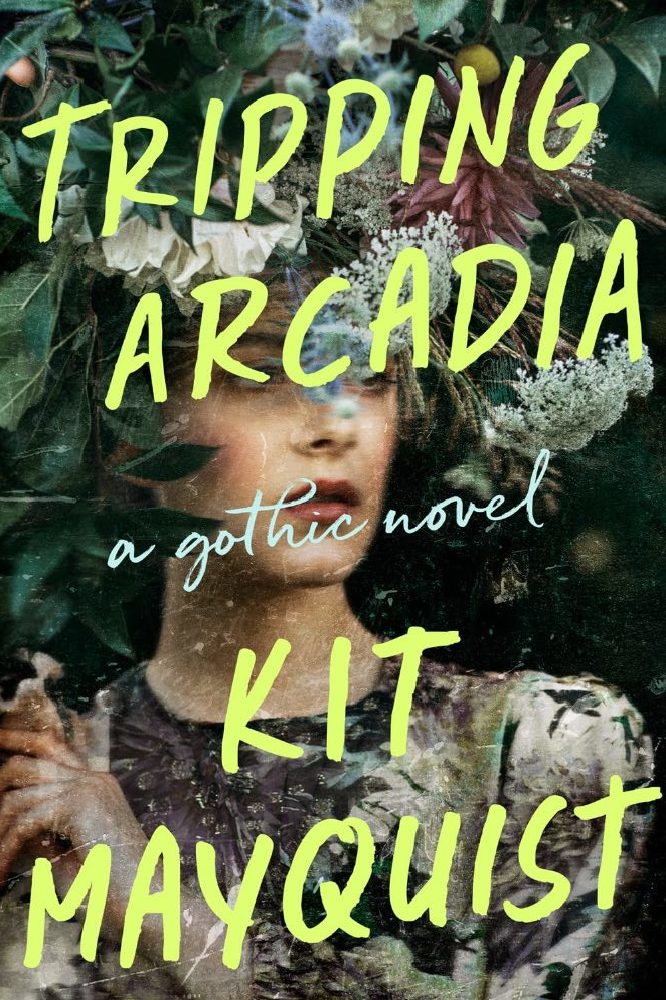When the premise of a Great Gatsby-esque gothic novel with LGBTQ+ romance and poisonous revenge is presented to you, you don’t turn away. You allow yourself to be sucked into a world of elite hedonism and gently unfolding horror, on tenterhooks for the inevitable love tryst.

Tripping Arcadia by Kay Mayquist / Image credit: Dutton
Indeed, there was little that could stop me reading the dark bourgeois fairytale that is Tripping Arcadia, which centres on a young med school drop-out named Lena who lands a well-paid job as an intern for the family doctor of one of the richest and most scandalous families in Boston. Morally, she wants to run for the hills, especially when she discovers the depth of depravity occurring at the family’s many drug-addled, orgiastic parties. But when she’s presented with her hefty bonus, she knows that it’s all she can do to stay working for this family and be able to provide for her near bankrupt parents. And now that she knows her own family’s tie to these secretive Verdeaus, she’s hellbent on revenge.
It has to be said, it is an elegantly written novel. Like a poison, the story creeps into your veins injecting discomfort and elements of horror on nearly every page. This is author Kit Mayquist’s gift. The characters feel real; flawed, but likable in their own ways. And there’s never a moment that elicits a cringe response, which is rare for such a dramatic tale.
The relationship between Lena and the rich and beautiful Audrey was compelling, and never gratuitous. And while I enjoyed the slow-burning mystery surrounding the plot, it was the moments of intense emotional expression that took my breath away the most. Jonathan’s pained screams. Audrey’s welling eyes. Lena’s nauseating panic.
On the other hand, Tripping Arcadia was rather lacking in subtlety, not to mention being over-dramatic in parts - a fact which wouldn’t have been a problem if other parts were starkly under-dramatic. For example, there’s far too much emphasis on Jonathan’s love of Marlowe and Keats. It’s meant to express his suicidal thoughts, but his attitude does that well enough without the morbid literary obsession that seems to inexplicably frighten everyone far more than his alcoholism. And when it comes to these elite parties, there’s very little truly debauched activity. We’re left a little underwhelmed by the conservative descriptions here. The very least I expected was a key party.
For most of the novel it always feels like we’re one step ahead of Lena; predicting outcomes and motives a few lines or pages before they dawn on her. This is frequently frustrating, not least because they often don’t need to be spelled out at all. It takes the edge off the mystery and doesn’t allow readers to work out much for themselves. Frankly, that’s half the fun of a mystery novel. Not that it sits comfortably in the realm of the “mystery” genre; it’s largely a gothic family drama with elements of, not full-scale horror, but certainly unease.
As for the denouement, it felt over-complicated and clunky. As twists go, it wasn’t bad, but it was far too explanatory, to the point of confusion, and it lacked the romance I expected. The dawning realisation that the reader should experience is rather masked by the labyrinthine task of putting together one-hundred-thirty-seven different plot points. I still don’t entirely understand the motives of all the characters.
MORE: The Paris Apartment book review
Still, there’s no doubt the writing in Tripping Arcadia is stunning. We just wanted more. And also less.
“They’d poisoned themselves for decades. A trip was a trip, and whatever didn’t kill them made them invincible. They lived in their own heaven, their own arcadia, where nothing, not even death, could touch them. Nothing except for me.”
Tagged in Books

